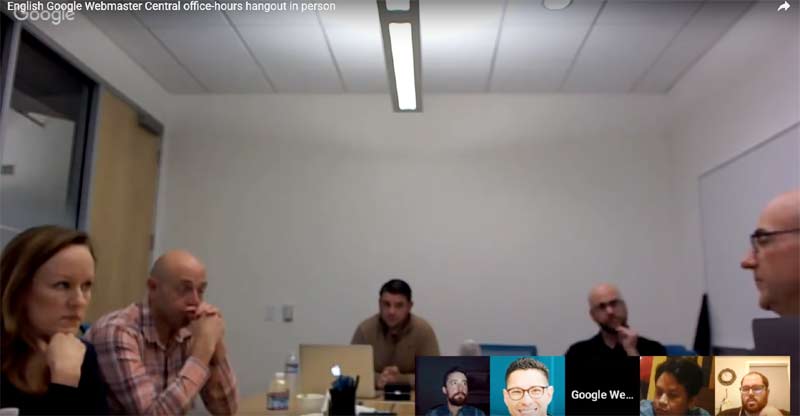In a Webmaster Hangout, Google’s John Mueller answered questions about when combining pages make sense and when it doesn’t make sense. Then explains the reasons why you should or should not do it. Interestingly and not surprisingly, combining authority signals is not one of the considerations.
Will Combining Web Pages Help Rankings?
Google’s John Mueller’s answer was clear. Combining web pages by merging weaker pages into a single page may result in a stronger and more relevant web page. But the advice was followed by the caveat that the pages must be complementary and address a single topic better as a combined page than several weaker pages.
 John Mueller shares insights on when it’s best to combine web pages for better rankings.
John Mueller shares insights on when it’s best to combine web pages for better rankings.Combining Relevance Signals
The question that started the conversation was about combining the authority metric of several weaker pages so that together they formed a stronger page, a page with more authority.
On merging content with varied ranking, will combining the pages of content result in better ranking because of the merged “authority” signals?
John Mueller (as well as other Googlers) has previously addressed the SEO concept of domain authority and denied that Google uses any kind of domain authority.
John Mueller completely ignored this aspect of the question and instead focused on the relevance of the pages together and whether the unified page made sense as a document about a certain topic.
The question about merging pages and their signals:
“The “non-existent” metric of authority, my particular question, from that perspective for example a site ranks for a certain topic, a certain subject matter. You have a site ranking on position five and another one on position six and they kind of have good authority, page one.
If you merge them and they make some signals that merge into a single piece of content on the same topic, would it move up your rankings?”
John Mueller answers question about combining pages:
Probably. I think that’s something that generally… we see if you take two or three or four kind of weaker pages and merge them into one, even within the same site or externally, then that’s something where we can say that this is a stronger page.
We can see that… more parts of the site are referring to this one single piece of content so it’s probably more relevant than those individual small pieces that you had before.”
John Mueller’s response appears to confirm that because all the other pages of the site are pointing to this single page rather than multiple pages that this is a stronger signal of relevance.
The Importance of a Primary Topic
Another participant in the hangout shared an anecdote of having merged two pages with different topics and seeing that the resulting page ranked less well than the two pages separately.
In other words, combining the signals and backlinks of two pages didn’t result in higher rankings because the subject matter of the two pages weren’t in harmony.
John Mueller’s insights on combining pages that are different:
“I think if you have really different pieces of content on different topics and that can happen. Because it’s basically you’re taking two completely separate pages, you’re putting them on the same page and then our algorithms have to think about like, “What’s the primary topic of this page?
Like it might be this, it might be that, it might be some weird mix that we figure out.”
The concept of a primary topic is, in my opinion, very important. A page can be about a single topic but then explore that topic from different perspectives. But it will still be about a primary topic. That’s content with depth.
But on the flip side, a page can be too diffuse. The word diffuse means spread out and wide ranging. That’s the opposite of focused.
So imagine a user has a question that needs answering. The content should easily present that answer.
My personal approach is to make it so that a person can understand what a web page is about simply by scanning it. My preference, based on my experience, is that a thumbnail test of a well organized page of content is that it can be quickly scanned and the meaning of it generally understood.
The takeaway for merging content is that the content must be similar and complementary in order for the signals like inbound links (both external and internal) and all the relevance they confer to work together to make the combined page stronger.
The Value of Combining Similar Content
Another hangout participant shared the anecdote of combining articles written by different authors on the same topic. Thus, the combined page contained different viewpoints, increasing the depth of the topic coverage.
John Mueller comments on combining pages so they’re stronger:
“I think that’s something that I generally try to recommend to people and if you can have fewer URLs and usually that makes it easier like from a management point of view.
But it also helps from an SEO point of view. Where we can really say, well this is… stronger content. This is something that’s referred to from a lot more places than these individual other pieces that you had before.”
That’s a great insight into how Google views relevance.
Rather than thinking in terms of non-existent metrics like Domain Authority, John Mueller’s responses encourages looking at the merging of pages in terms of how complementary the pages are to each other. This is the secret to successfully merging pages for better rankings.
Thinking in terms of how pages can work together is very much like cooking. There are some ingredients that simply don’t belong together. And there are some ingredients that create satisfaction.
Watch the Google Hangout here:
More Resources
- 5 Proven Ways to Increase Your Google Rankings
- Top 7 Ranking Signals: What REALLY Matters in 2018?
- 11 Things You Must Know About Google’s 200 Ranking Factors
Images by Shutterstock, Modified by Author
Screenshots by Author





![AI Overviews: We Reverse-Engineered Them So You Don't Have To [+ What You Need To Do Next]](https://www.searchenginejournal.com/wp-content/uploads/2025/04/sidebar1x-455.png)